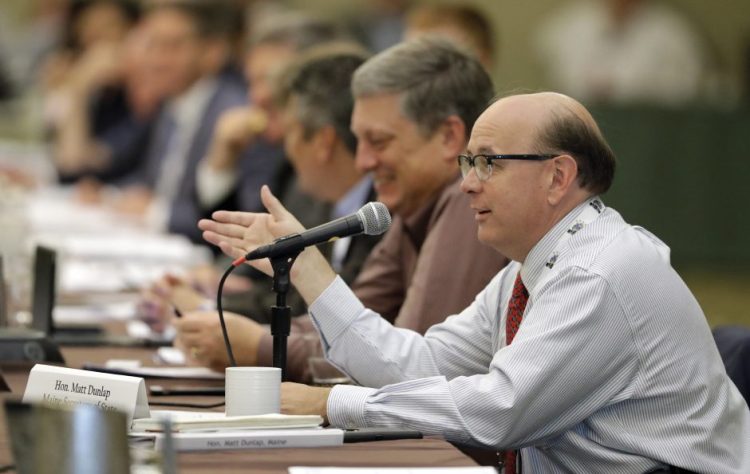Matthew Dunlap did right last week, standing up for sanity in the face of abject lunacy as President Trump’s Election Integrity Commission continues to careen into dangerous territory.
It is, however, unclear whether the Maine secretary of state’s place on this panel is worth it any longer. Now that the commission has been shown beyond doubt to be a sham, does the presence of a Democrat beholden to the facts make any sense? Or does it only hand the commission an undeserved patina of bipartisan respectability?
Those concerns have been there from the start, when Dunlap accepted the position on the commission run by Vice President Mike Pence and Kris Kobach, secretary of state and Republican candidate for governor in Kansas.
Kobach has made a name for himself as a fact-averse crusader, a fanatical pursuer of voter fraud who nevertheless has managed to find very little of it.
The commission itself was born out of Trump’s ridiculous and unsupported statement that as many as 5 million people voted illegally – all against him – in the 2016 election.
Regardless of its leadership and provenance, we thought Dunlap’s participation at the outset was a good thing – he would provide an informed, steady response to the fact-challenged bomb-throwing, and possibly help guide the commission toward the real threats to our election integrity: foreign interference and vulnerable electronic voting systems. Those concerns seem even more pertinent now that we know the extent to which Russia used Facebook ads to influence the election.
Now, it appears that the commission may be beyond saving.
In a piece written for far-right – some would say white-nationalist – Breitbart News, where he is a paid columnist, Kobach said that the around 5,000 New Hampshire residents who registered to vote with out-of-state licenses are proof that the 2016 U.S. Senate race, won by Democrat Maggie Hassan in a close vote, was “stolen through voter fraud.”
That would be a laughable statement if it were not so inflammatory – Dunlap called it “reckless.” The voters were likely students, who as residents for most of the year legally are allowed to vote.
Also last week, it was revealed that Hans von Spakovsky, a member of the commission whose hands are all over efforts in recent years to suppress the vote through unsubstantiated claims of voter fraud, wanted Democrats and moderate Republicans kept off the commission, lest they weigh facts and other hard evidence over demogoguery and innuendo.
It’s hard to see the commission now as anything but part of an effort to cast aspersions on the electoral system for the purpose of suppressing the vote. Voter fraud – nonexistant in anything close to meaningful numbers, and caused by honest human error in the tiny numbers it does occur – is simply a pretense for making it harder to vote, either by erecting barriers to registering or by purging voter rolls, a process that eliminates eligible voters as collateral damage.
Dunlap’s sharp criticism drew attention to that anti-democracy attack. But that appears to be all he can do – Kobach’s commission will continue on with its assault on the electorate.
Maybe that’s a sign that Dunlap’s time on the commission has run its course.
Send questions/comments to the editors.


